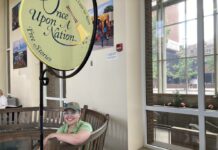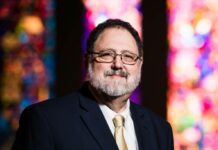
Harry Boonin majored in Russian in college, but it “wasn’t very important to me,” he said. Then he went to law school and became a lawyer, but he didn’t love practicing law.
Finally, in 1977 at age 40, he saw a book on the table at his mother’s house in Trenton called “Finding Our Fathers: A Guidebook to Jewish Genealogy,” by Dan Rottenberg. Boonin took the book, drove home with his wife Ruth and their kids, put the kids to bed and started reading. He read until 3 a.m. — then woke up early the next morning to read some more.
He hasn’t stopped since.
Today, Boonin, who lives in Warrington and is a member of Reform Congregation Keneseth Israel in Elkins Park, is a Jewish genealogist. He founded the Jewish Genealogical and Archival Society of Greater Philadelphia in 1979 and grew it to include more than 400 members. He has written four books, including one about “The Jewish Quarter of Philadelphia,” and 250 scholarly articles. And in August, he received a lifetime achievement award from the International Association of Jewish Genealogical Societies at its virtual conference.
“He was recognized for his pioneering role and over four decades of leadership, scholarship and mentorship in Jewish genealogy,” according to a news release.
“It’s much more important than the law,” said Boonin, who retired from his law practice three decades ago.
The 85-year-old wants to be clear. His legal career went just fine, and he enjoyed the people he worked with. But once he discovered Rottenberg’s book, he couldn’t stop thinking about Jewish genealogy.
Boonin liked the way Rottenberg, a Philadelphia-based journalist who worked for The Philadelphia Inquirer and other publications, used research to find out more about his family history. Boonin said the experience of reading the book motivated him to research his family history, a desire he never had before.
In the late 1970s, he wrote a letter to a Russian author who wrote about the town where Boonin’s family originated. A year went by. Then one day, the lawyer got home from the office to find a letter on the table. His wife told him it was from Russia.
The Russian professor had responded in Polish with two or three pages tracing Boonin’s family to 1804. Boonin had to send it to his former Russian teacher at Penn State University to get it translated, but once he did, he started reading the letter like he once read Rottenberg’s book.
“I really got into it,” he said.
Boonin wrote what he described as “a very short article” about this history for a magazine whose name now escapes him. After that, the Jewish Genealogical Society in New York contacted Boonin about giving a talk.
A sizable audience showed up, and while Boonin was “up there blabbing,” as he remembered it, he looked down at the front row and saw Rabbi Malcolm Stern, “the father of Jewish genealogy in America,” as Boonin described him. The lawyer thought to himself that he should be sitting in the front row while Stern gave the talk.
But after the event ended, Stern approached Boonin.
“He said three words I’ll never forget: ‘That was delicious,’” Boonin recalled. “The words gave me so much confidence.”
Boonin started the Jewish Genealogical and Archival Society of Greater Philadelphia and began doing deeper research to produce longer articles. In 1989, he published an 8-10 page article in a Jewish ancestry magazine with about 3,000 readers. Over the next decade, he wrote many more pieces with similar depth.
He also published the first book about Philadelphia’s Jewish quarter, a part of history that he believes should get more attention. The quarter, which consisted of about 12-15 blocks between Spruce and Christian streets and Second and Sixth streets, came alive when Eastern European Jews immigrated to the United States between 1890 and 1910 to escape antisemitism, Boonin said.
“We have more in the Jewish quarter than any other city, leaving out New York City,” he said.
Boonin has also written books about Jewish boxers and his mother’s side of the family and their immigration to the U.S. He can still talk at length about each topic, too, even years after finishing the stories.
According to Boonin, one of Yankee Stadium’s first big events after it opened in 1923 was a fight between two Jews: Benny Leonard and Lew Tendler. A crowd of 58,000 showed up, including Yankee legend Babe Ruth.
“He’s 85 years old, but he’s not stopping,” Ruth Boonin said of her husband. “He always wants to do more and more.” JE






